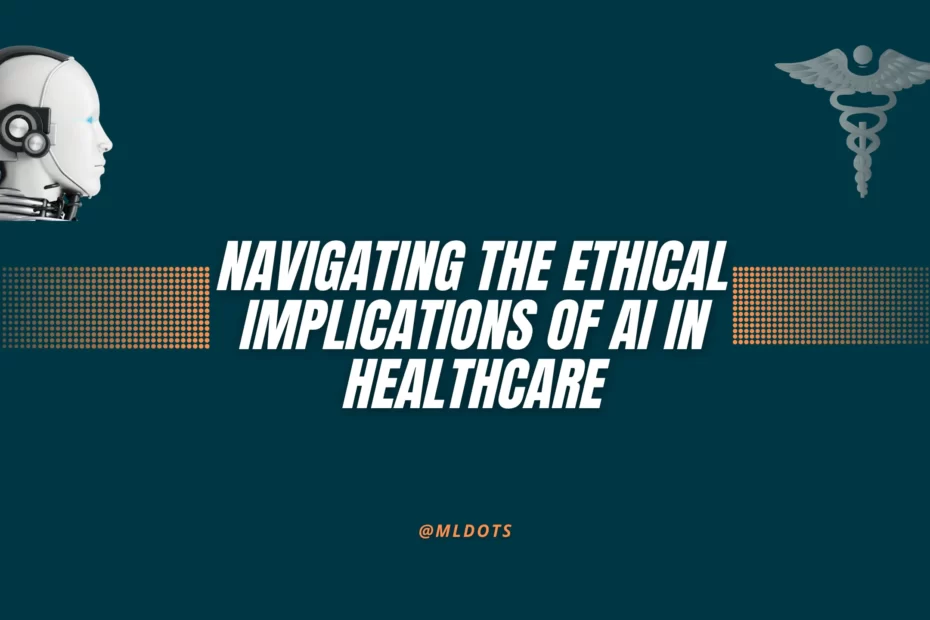Healthcare is one of the sectors where artificial intelligence (AI) has become a game-changer. AI holds great promise for transforming patient care, streamlining diagnosis, and improving treatment outcomes. To ensure that AI is used responsibly and ethically in the healthcare industry, however, ethical issues also need to be addressed along with these technological breakthroughs.
This article investigates the ethical ramifications of artificial intelligence in healthcare, examines the difficulties it poses, and provides suggestions, best practices, and solutions to solve these issues.
Ethical Implications of AI in Healthcare
- Patient Privacy and Data Security
- Bias and Discrimination
- Accountability and Transparency
- Informed Consent and Autonomy
- Patient Privacy and Data Security: The protection of patient privacy and data security is one of the main ethical issues with AI in healthcare. An inherent risk of data breaches, unauthorized access, or misuse of personal information exists since AI systems rely on enormous amounts of sensitive medical data. Healthcare organizations must employ strong data protection measures, such as encryption, access controls, and routine audits, to reduce this risk and maintain compliance with privacy laws like GDPR and HIPAA.
- Bias and Discrimination: The data that AI algorithms are taught determines how impartial they are. Without due care, AI systems may inherit and reinforce the biases seen in healthcare data, producing unfair results. To address this problem, training data for AI models should be representative, diversified, and extensively screened for biases. Additionally, ongoing oversight and auditing of AI systems can assist spot and correcting any discriminating tendencies.
- Accountability and Transparency: The opaque nature of AI algorithms can obstruct healthcare accountability and transparency. Understanding the reasons behind decisions made by AI systems that directly affect patient care is crucial. Healthcare professionals need access to explainable AI models so they can comprehend and validate the results. Additionally, businesses should set up clear lines of responsibility to make sure AI systems are responsible for their activities.
- Informed Consent and Autonomy: Although AI technologies have the ability to support decision-making, they shouldn’t infringe on the autonomy of patients. When using patients’ personal data for AI applications, informed consent is essential. The use of AI in patient care must be clearly disclosed to patients, together with any possible hazards, and they must be given the option to decline AI-based interventions if they so choose.
Recommendations and Best Practices
- Regulatory Frameworks and Standards: Regulatory organizations should work with experts to build thorough frameworks and standards in order to handle the ethical concerns of AI in healthcare. These frameworks should address data security, accountability, bias mitigation, explainability, and privacy. Regulations can promote ethical AI implementation while defending patient rights by setting specific rules.
- Ethical Review Boards : Organisations in the healthcare industry should create specialized ethical review committees or boards with diverse knowledge. These boards can make sure that before being used, AI applications in healthcare are rigorously and ethically reviewed. In order to encourage ethical AI adoption, ethical review boards might examine data collecting procedures, algorithmic design, and potential hazards to patient privacy and autonomy.
- Algorithmic Transparency and Explainability: The creation of open and understandable AI algorithms should be a top priority for developers and healthcare practitioners. Healthcare professionals can more easily comprehend and have confidence in the judgments produced by AI systems by including interpretability strategies like rule-based systems or model-agnostic explanations. Increased transparency will promote better cooperation between human specialists and AI and assist accountability.
- Continuous Evaluation and Monitoring: Through constant assessment and monitoring, the ethical implications of artificial intelligence in healthcare must be addressed. AI systems should undergo routine audits to check for bias, privacy violations, and unforeseen repercussions. Additionally, feedback loops should be set up to incorporate suggestions from medical experts, patients, and affected communities into the development of AI systems.
Possible Solutions for Ethical Implementation
- Interdisciplinary Collaboration: To ensure the ethical application of AI in healthcare, cooperation between healthcare practitioners, AI specialists, ethicists, policymakers, and patient advocacy groups is crucial. Bringing together various viewpoints can aid in the construction of strong AI systems that prioritize patient welfare as well as result in a more thorough grasp of the ethical implications.
- Education and Training: To improve AI literacy among healthcare personnel, educational and training initiatives should be created. To make thoughtful judgments about the integration of AI into healthcare practices, administrators and clinicians must be aware of the strengths and weaknesses of the technology. Additionally, ethics education should be made available to provide medical professionals with the tools they need to deal with the ethical problems that AI technologies present.
- Public Engagement and Dialogue: Building trust and addressing concerns about AI in healthcare depend on involving the public in the conversation. Public consultations, town hall meetings, and open forums can offer chances for people to express their views, pose questions, and participate in the creation of ethical standards. The future of AI in healthcare should be actively shaped by healthcare organizations, patients, carers, and communities.
The field of healthcare could be completely transformed by artificial intelligence. But we must confront the problems involved if we are to use its advantages ethically. We can develop a responsible and patient-centric AI healthcare ecosystem by putting patient privacy first, minimizing bias, assuring accountability, and encouraging transparency. We can chart the course to a future in which AI aids healthcare practitioners, respects patient autonomy, and ultimately improves patient outcomes through collaboration, education, and strong governance frameworks.
